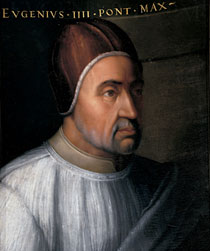March 4: Pope Eugene IV (1431): Spirituality and Brutality
Pope Eugene IV (1431)
 It was on this date, March 4, 1431, that Gabriello Condulmaro was elected by God’s agents to become the head of the Roman Catholic Church as Pope Eugene IV. It is important to remember that 1431, during the Hundred Years War, is the same year in which 19-year-old Joan of Arc was tried and executed by burning.
It was on this date, March 4, 1431, that Gabriello Condulmaro was elected by God’s agents to become the head of the Roman Catholic Church as Pope Eugene IV. It is important to remember that 1431, during the Hundred Years War, is the same year in which 19-year-old Joan of Arc was tried and executed by burning.
Gabriello was born into a wealthy Venetian family on an unknown date in 1388. The Catholic Encyclopedia glosses over the fact that he was the product of a liaison between his real father, later Pope Gregory XII (1406-1417), and his aunt. He was pulled from his Augustinian monastery at age 24 and made Bishop of Siena, but as the rulers of the kingdom objected to a bishop who had never been a priest, “uncle” Angelo (Gregory) instead installed Gabriello as Cardinal-Priest of St. Clement.
As Cardinal, Gabriello fathered several children, including at least one, who would later become Pope Paul II (Pietro Barbo), through an incestuous relationship with his own sister. The Catholic Encyclopedia will claim, of course, that popes are infallible, not impeccable. But this desperate apologetic gymnastic deflates any claim of moral superiority for the Roman Catholic Church, for how could the Holy Spirit not look after his own?
At about age 43, Gabriello took the name Pope Eugene IV and, although mentored by his notoriously nepotistic predecessor, Pope Martin V (Ottone Colonna; 1417-31), Eugene immediately set upon the Colonna clan and extracted from them their castles and titles and an indemnity of 75,000 ducats. It was only through the Colonnesi, rallying the population of Rome against this papal abuse of power, that a truce was established and peace restored.
Eugene next tried to de-authorize the Council of Basle, which had opened under Martin V (of the rival Colonna clan) that very year. But in December of 1433 Eugene was forced into a compromise: the Colonna had set up a nominal Republic in Rome and Eugene, fearing for his life, was forced to escape Rome in disguise.
But by October 1434, Eugene returned to Rome, with the help of the militant Bishop of Recanati, the bloodthirsty Giovanni Vitelleschi. Spilling oceans of blood, thousands of men, women and children were slaughtered, tortured and burned on orders of Pope Eugene. Thus the obedience of Rome was secured. But Eugene’s brutality so horrified Rome that once again he was expelled (1436) and forced to set up his Papal Court in Bologna. There he stayed for the next seven years, creating a court full of prostitutes and villains for his entertainment.
But in 1437, the Council at Basle issued a monitum against Eugene, that is, a warning issued to an errant cleric, accusing him of heretical conduct towards a general council. Eugene was pronounced deposed by the Council in 1439. He was succeeded by the completely incompetent antipope Pope Felix V. Eventually tiring of Felix, power slowly returned to Eugene by 1442. He remained pope until his death on 23 February 1447.
It should be added that Catholic apologists make much of Eugene’s Papal Bull, Sicut Dudum, in which he supposedly condemned slavery. The misrepresentation is recorded in the Catholic Encyclopedia. The claim is easily refuted: In his bull, Eugene condemns the taking Christians as slaves, but non-Christians, and those who refuse to become Christians, are lawfully enslaved. Indeed, Eugene established a formal licensing system giving authority to both territories and numbers of slaves taken according to a schedule of fees paid to the Roman Catholic Church!
So much for the brutality and amorality of Pope Eugene IV. This 15th century representative of God on earth was also one of the most superstitious men of his age. A.D. White points out with impeccable authority in his Warfare of Science with Theology, that Eugene,
… by virtue of the teaching power conferred on him by the Almighty, and under the divine guarantee against any possible error in the exercise of it, issued a bull exhorting the inquisitors of heresy and witchcraft to use greater diligence against the human agents of the Prince of Darkness, and especially against those who have the power to produce bad weather. In 1445 Pope Eugene returned again to the charge, and again issued instructions and commands infallibly committing the Church to the doctrine.*
But, then, in his bull Cantate domino, Eugene also says Jews and schismatics cannot enter heaven. Indeed, about the employment of Jewish physicians, White notes, “Gregory of Tours tells us of an archdeacon who, having been partially cured of disease of the eyes by St. Martin, sought further aid from a Jewish physician, with the result that neither the saint nor the Jew could help him afterward. Popes Eugene IV, Nicholas V, and Calixtus III especially forbade Christians to employ them.”**
Was Eugene just an exemplar of the superstition and brutality of the age, which for some inscrutable reason God allowed – apparently until Freethinkers showed a better way in our own day? It has always been an apologist’s tactic to claim, in so many words, that God was reticent to upset the prevailing morality. We are presumably talking about the same God whose “chosen people” are unmatched in brutality and superstition, and whose own murders of men women and children in the Old Testament were subtle as a brick!
* A.D. White, A History of the Warfare of Science with Theology in Christendom, 2 vols. (1896), Chapter 11. ** Ibid, Chapter 13.
Originally published March 2011 by Ronald Bruce Meyer.

